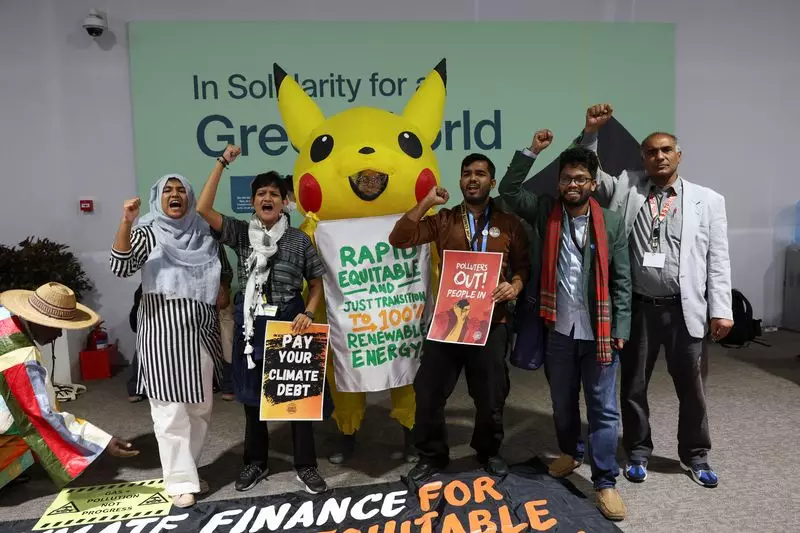As the world converges at COP29 in Baku, the dire plea from several conflict-impacted nations underscores a pressing need for a significant increase in climate funding. These countries are appealing for a doubling of financial assistance to over $20 billion annually, aimed at enhancing their resilience against an ever-worsening landscape of natural disasters exacerbated by climate change. The stark reality is that many of these nations, already reeling from the repercussions of conflict, face the additional burden of climate-related upheavals that threaten not only their economies but their very existence.
Island nations are vocal advocates of this cause, as rising sea levels pose an imminent threat to their habitats. Meanwhile, nations rich in rainforests argue for increased financial resources to preserve their vital carbon sinks, which are crucial in fighting global warming. The plight of conflict-affected regions, however, is particularly dire; these nations struggle to access private investments due to the perception of high risks associated with their instability. This situation makes access to United Nations funding imperative, especially for populations displaced by both warfare and climate-induced disasters.
In response to the growing demands for climate finance, the COP29 presidency has announced the establishment of a ‘Network of Climate-vulnerable Countries.’ This coalition aims to empower a collective voice in climate negotiations and resource allocations. The initiative includes members from the g7+, an intergovernmental assembly of fragile countries, and seeks to bolster these nations’ capacities to absorb more finance while creating platforms that make it easier for investors to discover and fund impactful projects.
Burundi, Chad, Iraq, Sierra Leone, Somalia, Timor-Leste, and Yemen are among the founding nations of this network, which has extended invitations to all 20 members of the g7+. Abdullahi Khalif, Somalia’s chief climate negotiator, emphasized the importance of this collective effort in providing a robust platform for countries that desperately need support. This initiative signifies a strategic move towards unified advocacy and action, essential for ensuring that the voices of the most vulnerable nations are not drowned out.
The appeal made by the g7+ countries at COP29 is crystal clear: they are demanding an explicit commitment to significantly boost financial support in any concluded agreements. They are advocating for a target that collectively approaches $20 billion annually to support adaptation strategies for climate change by 2026. This ambitious proposal, shared with major financial institutions including the United Nations and the International Monetary Fund, reflects an understanding that while many nations grapple with the impacts of climate change, those trapped in cycles of conflict face disproportionately severe challenges.
The stark disparities in climate funding allocations become glaringly evident when assessed through the lens of conflict-affected countries. For instance, in 2022, these nations received a meager $8.4 billion in climate assistance—merely a quarter of what they estimated as necessary according to research from ODI Global. This insufficient funding exacerbates the already critical situations in these regions, where humanitarian crises are compounded by extreme weather events.
The Dire Consequences of Inaction
The repercussions of failing to adequately address the systemic funding issues faced by conflict-affected nations are profound. As highlighted by UNICEF, a child born in war-torn South Sudan is 38 times more likely to be displaced by climate-related disasters than their counterparts in stable nations like those in Europe or North America. Such statistics paint a bleak picture of the future for vulnerable populations.
Advocates for climate justice, like Habib Mayar from the g7+, stress that the repercussions of climatic events are magnified in these conflict-hit regions. A flood or drought in such settings can precipitate far greater humanitarian catastrophes than similar events in stable countries. The message is clear: without immediate and substantial intervention in the form of climate finance, the already tenuous situation in these nations is likely to deteriorate further.
Global leaders gathered at COP29 must heed the urgent calls from conflict-affected countries for increased climate funding. The creation of a robust network aimed at fostering financial opportunities and collaborative advocacy is a step in the right direction, but it remains only part of the solution. If climate finance continues to neglect the unique challenges faced by these vulnerable nations, the world risks not only perpetuating cycles of poverty and instability but also falling significantly short in the fight against global climate change. It is imperative to act decisively and responsibly, recognizing that the health and resilience of our planet depend on addressing the needs of the most vulnerable among us.

